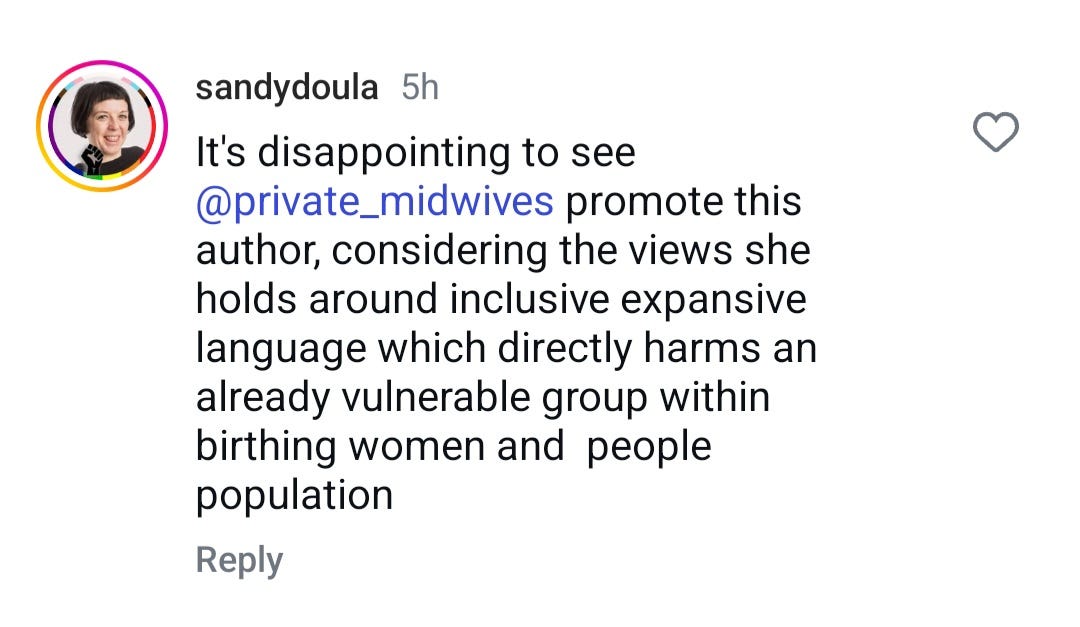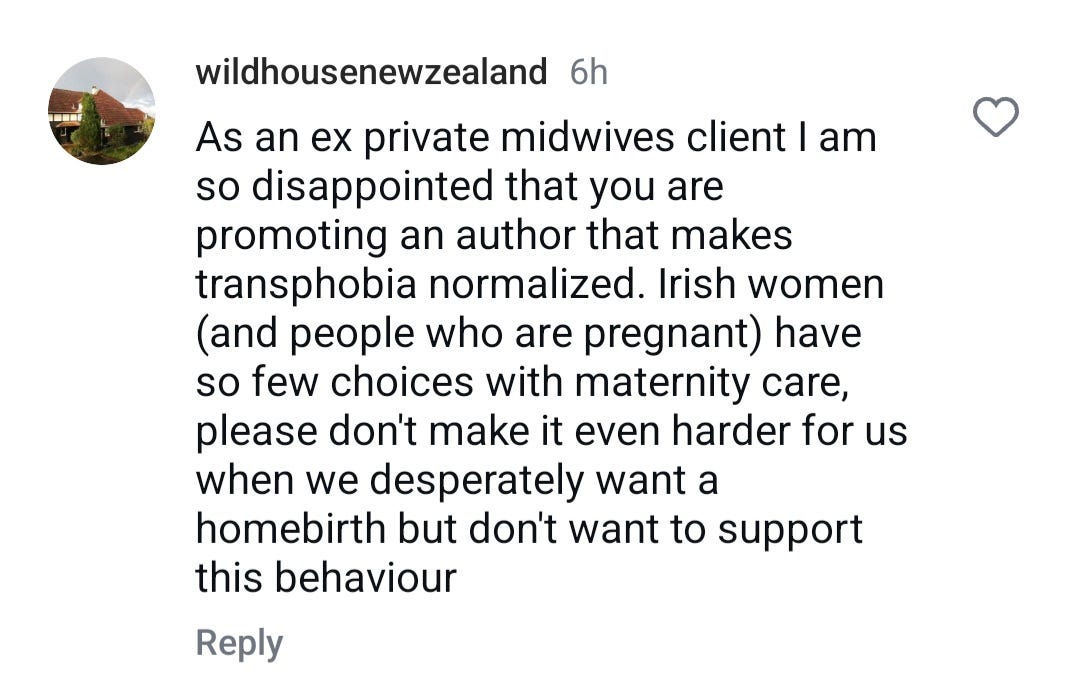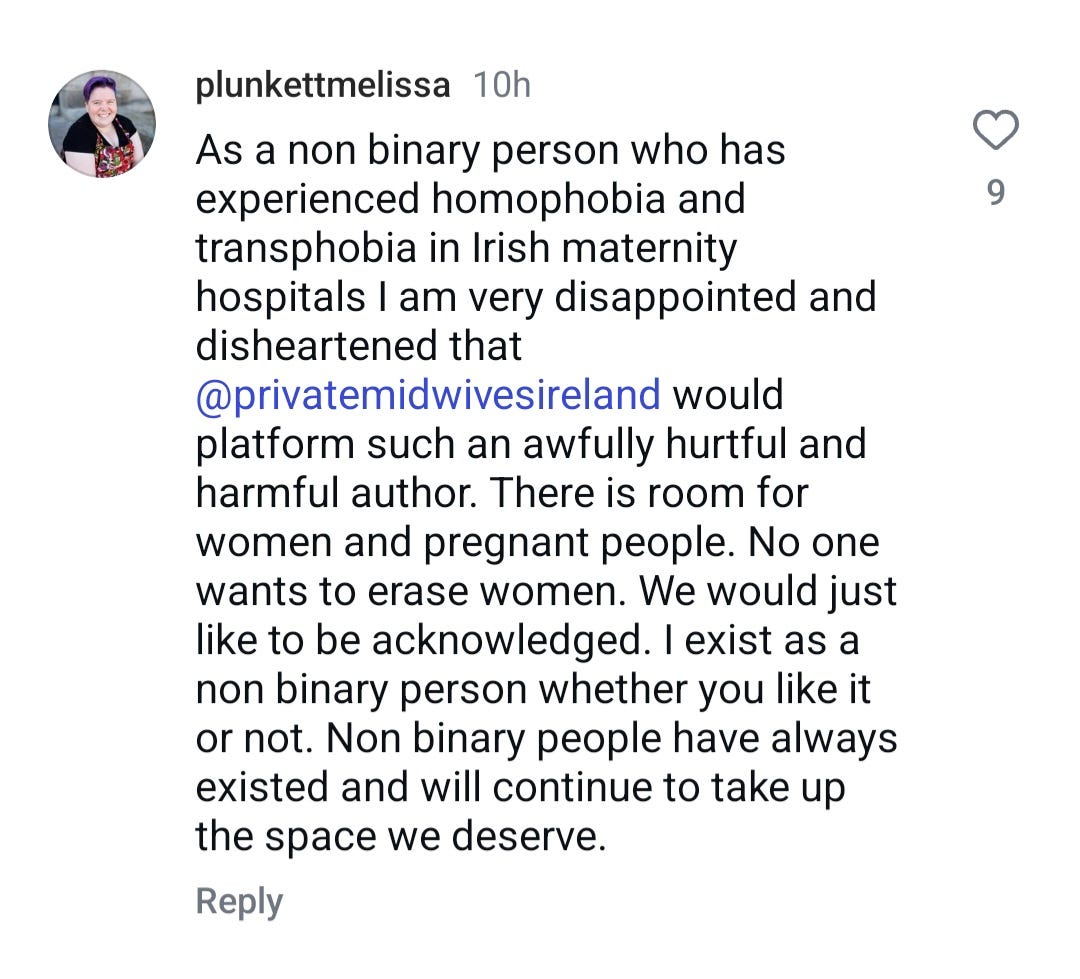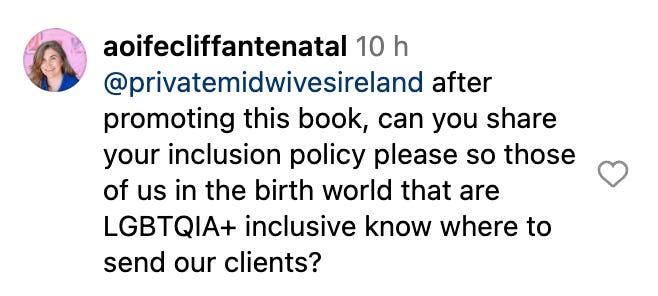Yesterday I gave an online talk to a group of doulas, and I was surprised to find myself crying. It’s nearly five years since I was attacked online and ‘cancelled’, but they wanted to hear that story. I wasn’t sure what to expect, and I was braced for criticism or even an unpleasant or awkward exchange. Instead, they were shocked and moved to hear the story first hand, and they showed me nothing but kindness. Hence the tears.
It’s not the first time I’ve been blindsided by a wave of emotion when talking about the events of November 2020. One other memorable time was when I spoke about it in the House of Lords. Of course, speaking in a venue like that, to an assembled group of MPs, many of whose faces you recognise ‘off the telly’, and several Lords in the mix, too, is pretty daunting. So I was already in a heightened state when I stood up to speak, that’s for sure. But what really moved me was seeing all their faces. Human faces. I’ve written about my ‘cancellation’ fairly extensively, but I don’t talk about it much. I don’t tell the story out loud. And when I stood up and read out loud that I had been called ‘violent’, ‘harmful’, ‘trash’, ‘dangerous’, ‘toxic’ and ‘hateful’ to that sea of VIPs, I saw nothing but horror and sympathy. And again, it was that shock and tenderness in their faces that made tears sting the back of my eyes.
This is the problem with social media. The humanity gets lost. A person can become a ‘brand’ or a ‘handle’. An individual may find themselves being piled onto and attacked in just the same way as a large corporation would be. But they’re not a large corporation. They don’t have a board room and an emergency PR department. They are just a mum, reading a bin fire of comments yet knowing they still have to put their phone down and make tea for their kids. When you tell the story out loud, whether to Lords or doulas, this becomes clear. People can see with their eyes that there’s a real human in front of them, with skin, and tear ducts, and feelings. Social media is dulling us all to this; as we spend hours a day on our phones, we numb ourselves both to our own feelings and the feelings of others. Humans have always been capable of both abject cruelty and limitless compassion, but social media gives us a tool for the former with which we don’t even have to get blood on our hands.
Anyway. Yesterday I cried. And then a funny thing happened - yet another social media pile on. An organisation called Private Midwives posted about my second book, Give Birth like a Feminist.
“This powerful book challenges traditional views on childbirth and empowers women to make informed choices about their own bodies and birthing experiences”, they wrote.
And then the comments began. I’m not going to share them in the main body of this article - but I will screenshot some of them and put them as an appendix below. (I do think it’s important to record this madness for posterity). But, wow, they really knocked me sideways. Five years of this. And a sinking realisation of how impactful it’s all been on my career and livelihood, if we are still seeing now a post promoting one of my books, getting this level of vitriol. As I look forward to a new book coming out in July, I do wonder how that, too, may be affected. And, as I don’t live in a version of Sliding Doors where I can watch two different lives play out, I guess I’ll never know.
Apart from the impact on my career and livelihood, what really hurts is being perceived as a hateful person, when in reality, I’m genuinely compassionate. That’s a bold claim, I guess, but maybe it’s helpful if I set out some views I shared in a conversation with a friend recently, who was telling me about a teenage girl (let’s call her AJ) she had met who identifies as male. For AJ, I feel compassion. As I hear my friend describe her, I imagine her inner turmoil, and I genuinely feel for her, and for her parents, too. I accept that she exists, and I accept that she wishes to be seen as male. Were I to meet her, I would call her what she wished to be called and treat her with respect. What I don’t accept, however, is her belief that she has some kind of inner essence that is male and that this male essence is mismatched with her physical female body. That she needs drugs and surgery to make her body match her ‘gendered essence’. I don’t believe in this phenomenon, which to me seems quasi-religious and unscientific. I worry for AJ, that this belief will lead to her mutilating her healthy body. And what I see as a much more likely explanation for her feelings of being ‘mismatched’ is that she has a) been given this idea from somewhere, and b) the idea has landed on fertile ground.
Last night my fourteen year old daughter chatted to me about how several of her friends now have to have packed lunches at school because of concerns about eating disorders. "Everyone’s getting them, mum”, she joked, “It’s like it’s catching”. We talked about how sometimes anorexia could be 'catching’, it could happen in clusters, and she laughed about how she didn’t think she would catch it, because she likes beans on toast too much. Although I’d never be complacent about such matters, I do think she’s probably right, and that whilst like all of us she has her own set of issues, she doesn’t have that specific type of fertile ground needed for the seeds of an eating disorder to take.
As a feminist, hearing the story of AJ, it is the fertile ground that interests me. It is obvious where she and other teens are getting the idea that body and gendered soul can be mismatched - online. It is quite clearly another kind of social contagion. But why is this idea taking root in some girls and not others, and overall, in an increasing number of young women? What is causing the ground to be so fertile?
This visible uptick worries me when I think of the bigger picture of the world I live in as a woman, and the world a teenage girl like AJ sees as she begins to become a woman in 2025. I feel compassion for all women living in this world. For AJ, puberty was the trigger. As her female body began to develop, she felt: this is wrong, I don’t want this. Why? I understand that she believes the explanation is simple: she is a man. But I don’t believe this. I worry that, instead, this is a new kind of misogyny, a turning away from being female, an attempt to identify out of a life as the ‘second sex’. For some, this might be triggered by experiences of abuse. For others, it could be that being female seems unappealing in a world in which we are objectified, upskirted, sent dick pics, raped, choked during sex and pressured to look like porn stars. A world in which we are paid less, and valued less, still, in 2025. Rather than try to change the world for women, it’s perhaps easier to simply decide not to be one. I think that’s what AJ has decided.
I think all these thoughts with compassion and respect for AJ and for any person caught up in this current phenomenon. I don’t think that AJ has made any of these decisions consciously - in her mind, she clearly believes the mismatch theory. I’m reminded of a story from when I was a therapist, of a colleague who’d been given the most interesting assignment: the Catholic church asked her to run a psychodynamic psychotherapy group with a cohort of novice nuns - women who were preparing to join the order - forever. Of course, all of them believed 100% that being a nun was a calling from God, and that it was the best and only way for them to spend their lives. But. After many weeks of intensive group therapy, during which they explored their childhoods, their faith, and their darkest experiences and emotions, not one of them decided to take their vows. They all worked out that it wasn’t a vocation at all that was prompting them to turn their backs on life as most of us know it. It was something much deeper, that they’d been keeping secret, even from themselves. The idea of being a nun had fallen on fertile ground, but once they explored what was making that ground so fertile, they didn’t want to be nuns anymore. And if they hadn’t had that therapy, they would probably still be nuns today.
Of course, saying that people who take Holy Orders may very well change their minds if they explored their unconscious motivations, would probably be considered highly offensive by those with a strong faith, just as saying that AJ might decide to be happy in her own skin if she worked out what it was about being a woman she was afraid of, definitely marks me as a gender heretic. But I disagree. I think it makes me compassionate - I want the best for young women who want to be nuns, and for young women who want to be men. I don’t like to think of any of them having a life of regret. I care.
For thinking my heretic thoughts and for caring, I, like many other women, have been severely punished. Today the words that have been said about me on that instagram post have made me want to give up. I’ve thought about changing my name and completely disappearing. I’ve cried (again). I’ve felt a lot of fear and anxiety about this next book I’ve got coming out, and publishers and publicity and all of that stuff. You just never know when things are going to escalate or implode. I wish I could somehow make it all go away. But I can’t. I am a human alive on this planet right now, and I feel that what’s happening is wrong - wrong for AJ, wrong for other children caught up in this, wrong for women’s hard won rights. And even though the waves of damage to my career seem to ripple endlessly, I have to keep true to myself and to what I feel is right. I just hope that eventually, I won’t have to keep telling these stories. Because - on a personal level, as a human, they really do hurt.
Please subscribe so that you never miss a post. You can subscribe for free, but paid subs help support me to keep writing. Substack is a new model of reading in which you get to pay money directly to the writer, rather than to the newspaper or advertiser. It’s only a small amount a month but each subscription adds up to mean that writers like me can get paid for our work. Thank you.
I’ve written four books, would you like one?
Appendix:

















Dear Milli. Those comments are just opinions and say more about the writer’s closed mind and harsh judgments than about yourself. Keep close to those who love you and welcome your views. There are many of us who support you and your views.
You are wonderful! You have no idea how far and wide your influence goes! I have given your books to young women who also think you are wonderful. We are too quiet I know but we are here. Please believe it!!